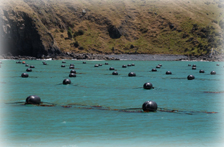 |
 |
|
|||
 |
|||
 |
|
Habitat Modification and Destruction Sand mining is another activity that could threaten New Zealand marine mammals. For example, there are plans for sand mining throughout the range of the North Island Hector's dolphin or Maui's dolphin. Typically, it takes between one and three years for the plants and animals that live in and on the sand to recover to the same distribution and total numbers after a sand mining operation. However, it can take much longer for the community composition to recover. For example, the removal of some organisms and crushing of others tends to attract scavengers into the area, changing the local ecology. Publications and reports |
For a list of general Trust associated publications and reports on marine mammals and marine mammal ecology, click here. To find out about the people involved in this research, see the University of Otago Marine Mammal Research Group web site. |
